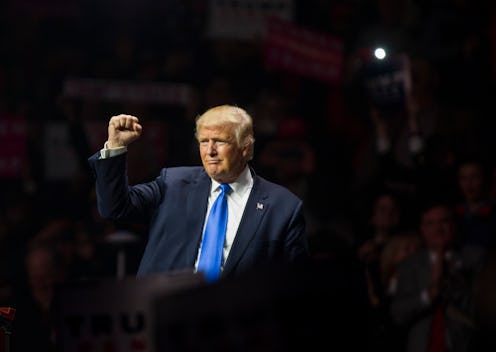News
Racist Culture Is Stronger Than Ever
My palms sweaty, I unlock my phone just in case something happens to me. My heart is pounding and I can’t help but be hesitant about every move I make in this moment. I am a Black woman, and two cops are walking behind me, step by step, in the grocery store parking lot. And I’m anxious. Thoughts are racing through my mind: “Did they think I took something from the store?” “Are they going to follow me?” “Oh my goodness. Just act behaved.” I approach my car carefully, only to see the cops walk past me, to their car tucked away in the corner.
I am paranoid, but it's what I have to feel, being a Black American living in a country that supports Donald Trump's discriminatory rhetoric and encourages that behavior. It’s sad that I have to express the growing ball of anxiety I often feel because of the growing issues of racism against people of color in this country, but I can't help it; these emotions are completely validated by the treatment America has shown towards so many Black people. The names are too many: Jordan Davis, Philando Castile, Eric Garner, Johnathan Ferrell, Joyce Curnell, Sandra Bland, Tamir Rice, Kathryn Johnston, Freddie Gray, Matthew Ajibade, Michael Brown — and the countless others who’ve died in the last decade. Thanks to this list, the fear I’ve experienced for my own safety is nothing compared to what I feel when thinking about my Black family, especially my younger brothers and dad.
Today, according to a 2014 analysis of F.B.I. statistics by USA Today, an African-American is killed by a white police officer roughly twice a week, and this is not counting unsolved cases and unjustifiable shootings. We’re in the midst of a crisis, and the ideas spouted by Trump and his followers only give Americans an excuse to be more blatant in their discrimination. In the first 24 hours of President-elect Trump's appointment, many people took to social media to recount their experiences of racism within that day, and their accounts are terrifying.
According to the Federal Bureau of Investigation, 47 percent of hate crimes are racially motivated. We do not live in a post-racial society; it may be 2016, but discrimination still runs rapid. And Trump’s hateful words about African-Americans, Muslims, and other minorities in the U.S. are evidence of, and support for, the toxicity that is sadly growing in our country. Hate groups like the Ku Klux Klan have been ignited by our current racial discord, and are more powerful today than they have been since the civil rights era of desegregation. Just recently, Black students at the University of Pennsylvania were added to a racist GroupMe message that included violent threats toward them, reportedly sent by someone using the name “Daddy Trump," according to Philly.com.
We live in a society that is accepting of racist culture, that pumps its blood through a racially wounded heart. We are all affected by stereotypes, judgments and preconceived notions that hinder our ways of feeling and thinking towards one another, and minorities, especially now, are feeling that more than ever. There are things we must do as activists in our own communities to prevent future growth of cancerous racial thoughts; we must take the lesson learned from Nina Simone's Mississippi Goddam — “All I want is equality for my sisters and brothers, and me” — and put an end to the discrimination experienced by so many Americans.
These days, with Trump and his followers' beliefs all too powerful in our country, I keep thinking about the dangers my brothers may face. I have never been more cognizant of how society will treat them, or that, like Trayvon Martin, they could be unjustly killed due to their race. Far too many victims’ parents pray every night for their children to come home, that they can have one last meal with their sons. They pray that they can hug and smell the scent of their children once again. But all they have are memories.
Although I pray that my family never encounters this situation, my biggest hope is that we, as a society, will actually do something about it to stop it from happening. Our country may be filled with racism right now, but that can change. We must tend to historical wounds and systems that have cause many minority groups to feel betrayed because of their skin color or heritage. We should always have been doing this — but now, in today's America it's more crucial than ever.
